#o2 shepherd's bush empire
Text

#Kylie Minogue#O2 Shepherd's Bush Empire#Tension#Hold On To Now#Kylie's IG story#The One and Only Kylie
0 notes
Text
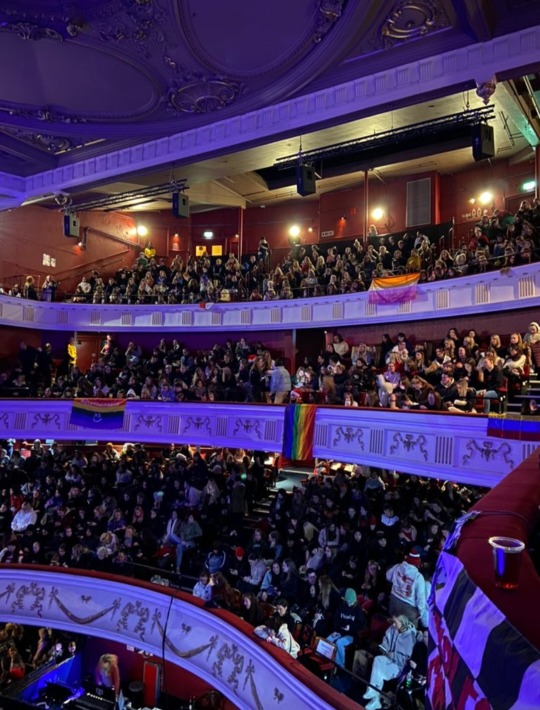
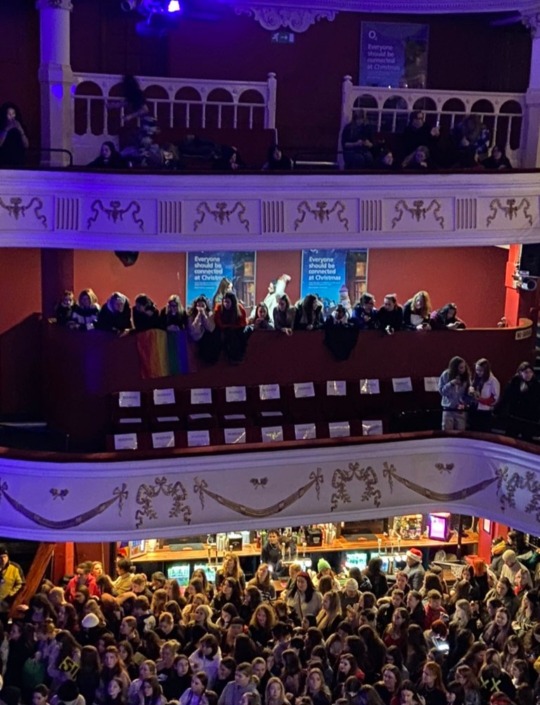
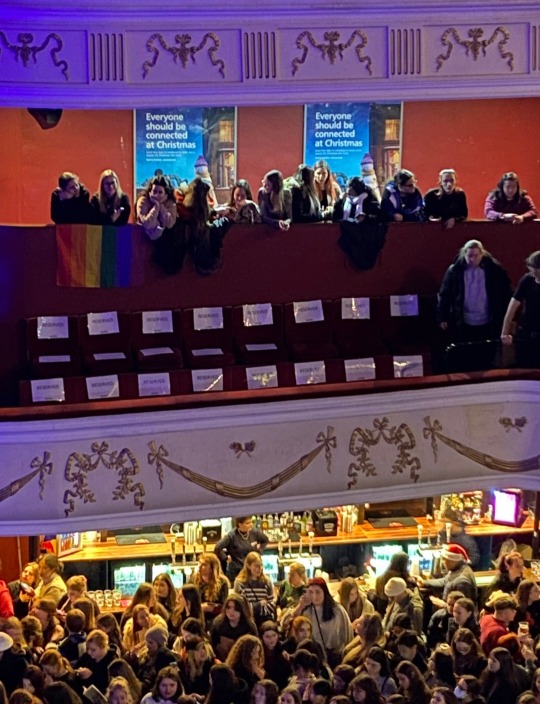
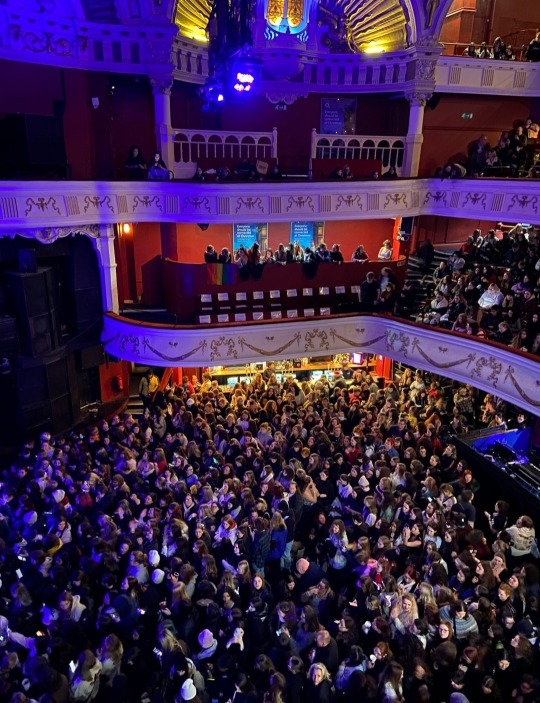

Inside the O2 Shepherd's Bush Empire [London, 12.14.22]
#venue#o2sbe#o2 shepherds bush empire#fitf ono london#12.14.22#rainbow flag#my repost#do you think the reserved seats are just family and friends or also the writers he worked with or industry people ?
276 notes
·
View notes
Text
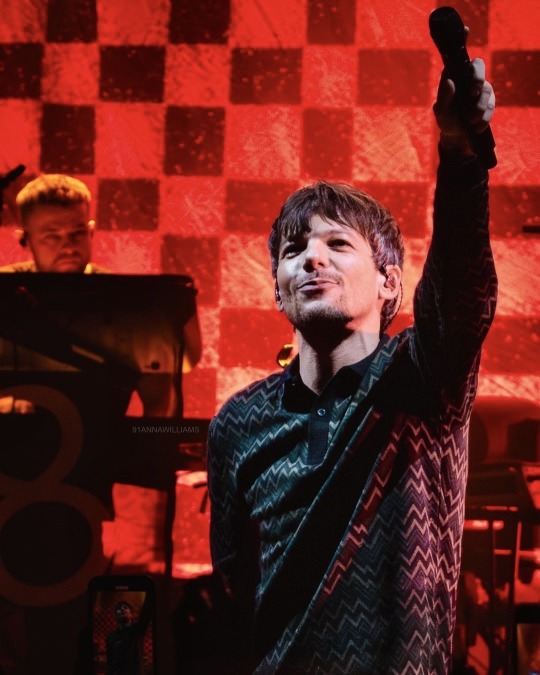
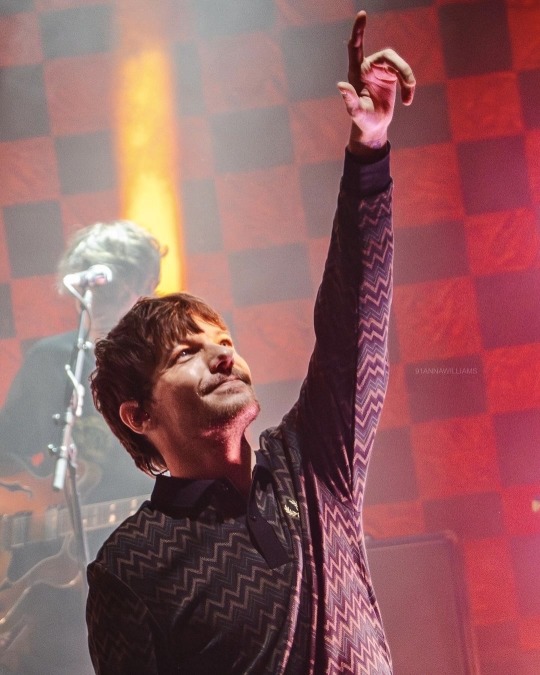
91annawilliams Louis Tomlinson | Faith in the Future, O2 Shepherd’s Bush Empire 14.12.2022
26 notes
·
View notes
Audio
Smiling by Alanis Morissette, unplugged live at the O2 Shepherd’s Bush Empire in London, from the remix album Such Pretty Forks In The Mix
#music#alanis morissette#michael farrell#michael kevin farrell#unplugged#unplugged live#o2 shepherd’s bush empire#live#shepherd's bush empire#live music#canadian music#fuck you sony
21 notes
·
View notes
Video
undefined
tumblr
General tickets for “CODE OF PERFUME” in London are now on sale.
Perfume LIVE 2023 "CODE OF PERFUME"
[Date] Saturday, June 3, 2023
[Venue] O2 Shepherd's Bush Empire (London)
[Door/Show] 19:00/20:00
[Ticket Prices]
Standing & Unreserved Seating 45£+ fees (advance) / 50£+fees (door)
Reserved Seating 55£+fees (advance) / 60£+fees (door)
[General Sales] April 14th (Fri.) 10:00 (GMT)
https://www.ticketmaster.co.uk/
10 notes
·
View notes
Text
youtube
The Greatest, from the intro, FITF Live In Concert, Shepherd's Bush Empire, London, 14 December 2022 x
#flashing#the greatest#FITF Live In Concert London#love this as the intro song#o2 shepherds bush empire#14 December 2022#Louis Tomlinson#Louis band#FITF promo#Louis vid#Youtube
2 notes
·
View notes
Text
okay folks, wish me luck that my trains aren’t cancelled and that i can 1) get to see louis tonight, and 2) get home after said concert safely and cheaply
2 notes
·
View notes
Text
Live Review: Zeal and Ardor with Zetra at the O2 Shepherd's Bush Empire (22/09/2024)
A sunny Sunday turns into a misty night as Zeal and Ardor arrive in London accompanied by the mysterious Zetra as part of their latest tour.
A sunny Sunday turns into a misty night as Zeal and Ardor arrive in London accompanied by the mysterious Zetra as part of their latest European tour.
Having released their fourth studio album, Greif, on the 23rd of August, Zeal and Ardor have been out championing that album, bringing some new songs to our ears to go along with the familiar bangers from previous albums. Zeal and Ardor are a band…
#Avant Garde Metal#Bloodstock Open Air#Devil Is Fine#Greif#Live Review#London gigs#Manuel Gagneux#O2 Shepherd&039;s Bush Empire#Sophie Lancaster#Zeal and Ardor#Zetra
0 notes
Text






courtney love photographed at O2 shepherd’s bush empire in london, england. may 10th, 1995
#courtney love#grunge#hole#hole band#celebrity skin#live through this#nobodys daughter#pretty on the inside#women in rock#music#rock#90s#courtney love cobain#kinderwhore
143 notes
·
View notes
Text
369 HOTSPOTS:
Africa:
Asia:
— Saranrom Park, Bangkok (3PM—5PM)
— New Delhi, Lodhi Garden (1:30PM—3:30PM)
— Tennis Indoor Senayan, Jakarta (3PM—5PM)
— Bengkel SCBD, Jakarta (3PM—5PM)
— Cross Maidan Garden, Mumbai (1:30PM—3:30PM)
Europe:
— Wizink, Madrid
— La Riviera, Madrid
— Razzmatazz, Barcelona
— Palau, Barcelona
— Miribilla, Bilbao
— Scala, London
— Shepherds Bush Empire, London
— O2 Manchester Apollo, Manchester
— O2 Arena, London
—Atlas Arena, Łódź (12PM—2PM)
— The Dome, Doncaster
— Utilita Arena, Sheffield
— Tauron Arena, Kraków (12PM—2PM)
— Międzynarodowe Targi Poznańskie, Poznań (12PM—2PM)
— Meo Arena, Lisbon (3PM—5PM)
Latin America:
— Rioarena, Rio de Janeiro (12PM—2PM)
— Allianz Parque, São Paulo (12PM—2PM)
— Espaço Unimed, São Paulo (12PM—2PM)
— Liggo Arena, Curitiba (12PM—2PM)
— Movistar Arena, Santiago (12PM—2PM)
— Estadio Bicentenario, Santiago (12PM—2PM)
—Pepsi Center WTC, CDMX (2PM—4PM)
— Autódromo Hermanos Rodríguez, CDMX (2PM—4PM)
— Auditorio Josefa Ortiz de Domínguez, Queretaro (2PM—4PM)
— Auditorio Telmex, Gudalajara (2PM—4PM)
— Arena V.F.G., Guadalajara (2PM—4PM)
— Parque Fundidora, Monterrey (2PM—4PM)
— Auditorio Citibanamex, Monterrey (2PM—4PM)
— Parque Centenario, Guayaquil (2PM—4PM)
— Coliseo Live, Bogotá (1PM—3PM)
— Movistar Arena, Bogotá (1PM—3PM)
— Movistar Arena, Buenos Aires
— Velez Sarsfield Stadium, Buenos Aires
North America:
— Skyla Credit Union Amphitheater, Charlotte (12PM—2PM)
—MGM Music Hall, Boston (12PM—2PM)
— House of Blues, Boston (12PM—2PM)
— AZ Financial Theater, Phoenix (2PM—4PM)
— Merriweather Post Pavillion, Columbia, MD (12PM—2PM)
— Kemba Live, Columbus (12PM—2PM)
— Oprheum Theathe, Vancouver (2PM—4PM)
—Doug Mitchell Thunderbird Sports Centre, Vancouver (2PM—4PM)
— Red Hat Amphitheater, Raleigh (1PM—3PM)
— Budweiser Stage, Toronto (12PM—2PM)
— Greek Theater, Berkeley (2PM—4PM)
— Fox Theater, Oakland (2PM—4PM)
—The Anthem, DC (1PM—3PM)
— Michigan Lottery Amphitheater, Sterling Heights
— Fillmore Auditorium, Denver
Oceania:
— Spark Arena, Auckland (7PM—9PM)
All times are LOCAL
*If you have information on more hotspots, feel free to send an inbox or add a comment with the exact place and time window
*Most hotspots are at venues Louis has played before, on tour or other separate gigs so if you're at a city Louis has been before, those places are most likely the ones you'll find. If not, there's still some hotspots in countries he's never visited so keep an eye out.
#put it under a read more because it'll get long#feel free to send the info of your local hotspots to be added#spain anon if you'd like to give me the time thats missing or anyone else knows
99 notes
·
View notes
Text





O2 SHEPHERD'S BUSH EMPIRE, LONDON 20/11/2021
170 notes
·
View notes
Text
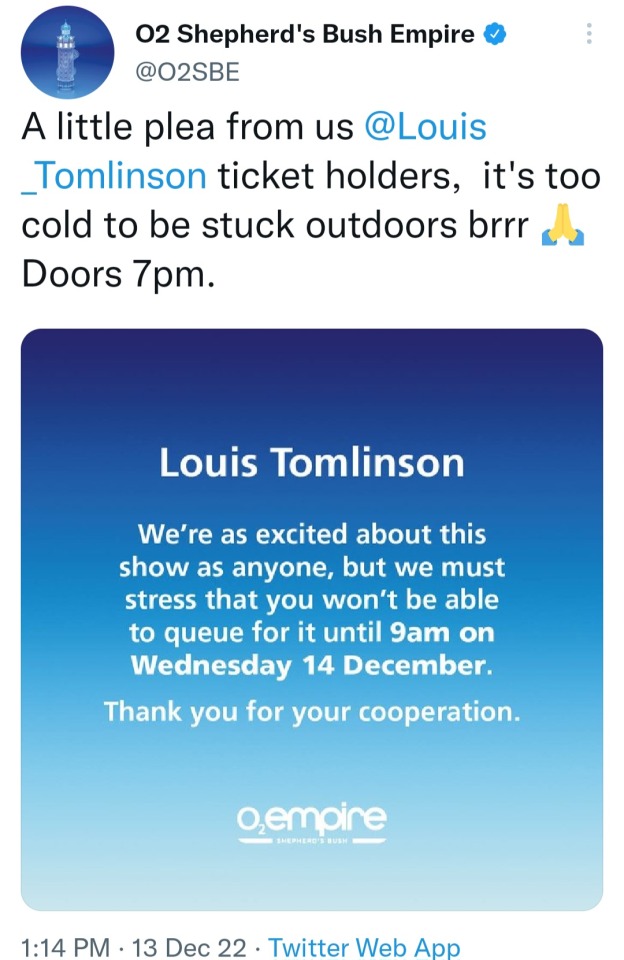
[12.13.22]
63 notes
·
View notes
Text




O2 Shepherd's Bush Empire
London 11.4.2024
📸: Sara Berne
65 notes
·
View notes
Text




Rita Ora attends the Girls Aloud concert at the O2 Shepherd’s Bush Empire in London, England.
137 notes
·
View notes
Video
undefined
tumblr
O2 Priority + PTA / WPTA Fanclub Pre-Sale Tickets are available now! To buy a ticket for “CODE OF PERFUME” in London you have to enter a PTA confirmation code (see PTA website). This code is only intended for those with "P.T.A." and "World P.T.A.".
Perfume Live 2023 “CODE OF PERFUME”
Sat, 3 Jun 2023, 19:00Sat, 3 Jun 2023 | O2 Shepherds Bush Empire, London
https://tourlink.to/Perfume23
#2023#prfm#perfume#code of perfume#london#O2 Shepherds Bush Empire#uk#perfume no okite#o2#a-chan#nocchi#kashiyuka
18 notes
·
View notes
Text
ENG translation: "We are advocates of the fact that it is possible to create in our language"
An interview with Bojan Cvjetićanin and Kris Guštin in Slovenian magazine Reporter Magazin, originally published December 2023
Original article written by Katarina Keček for Reporter Magazin; photos by Primož Lavre and Urša Premik; English translation by @kurooscoffee and another Joker Out Subs member, proofread by IG GBoleyn123.
Also available in audio version on Spotify, read by IG GBoleyn123:
If you repost quotes from the interview, please link back to this post!
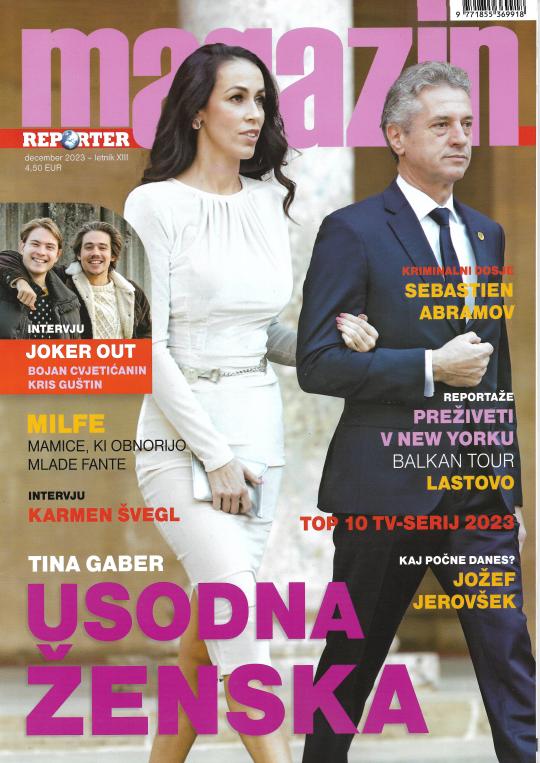
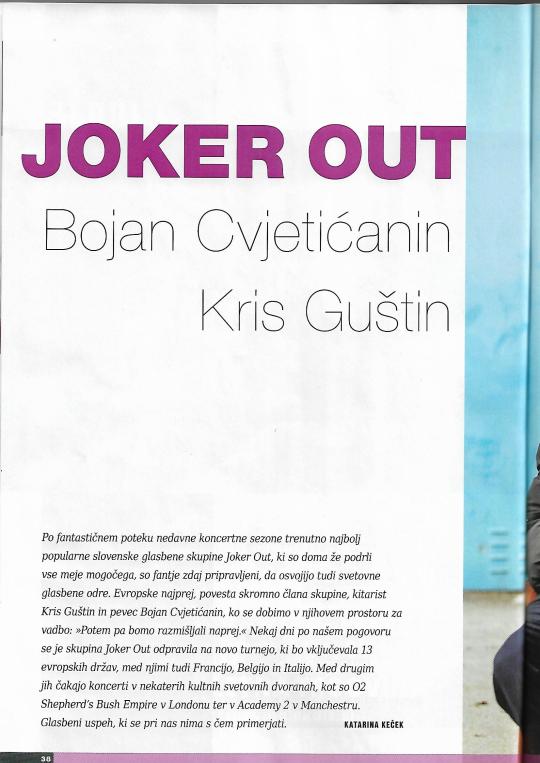
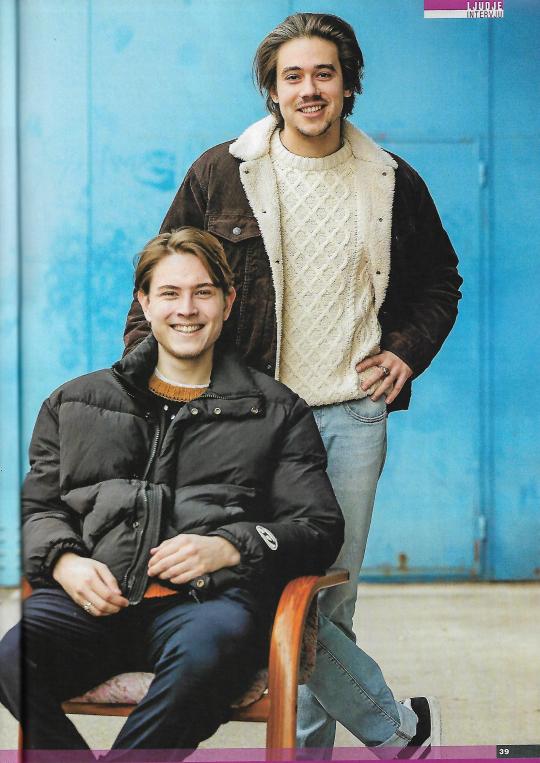
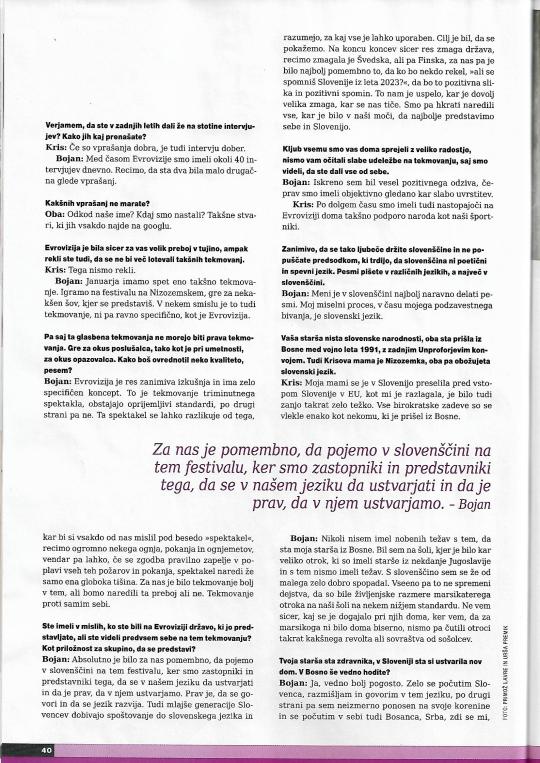
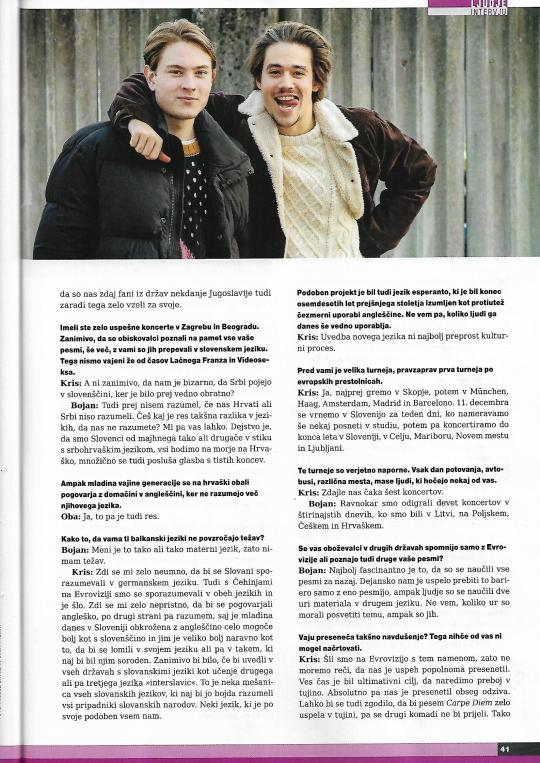
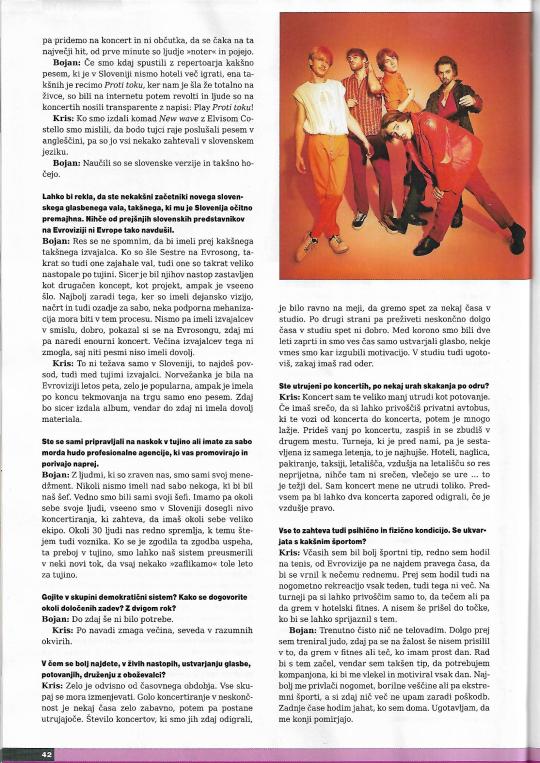
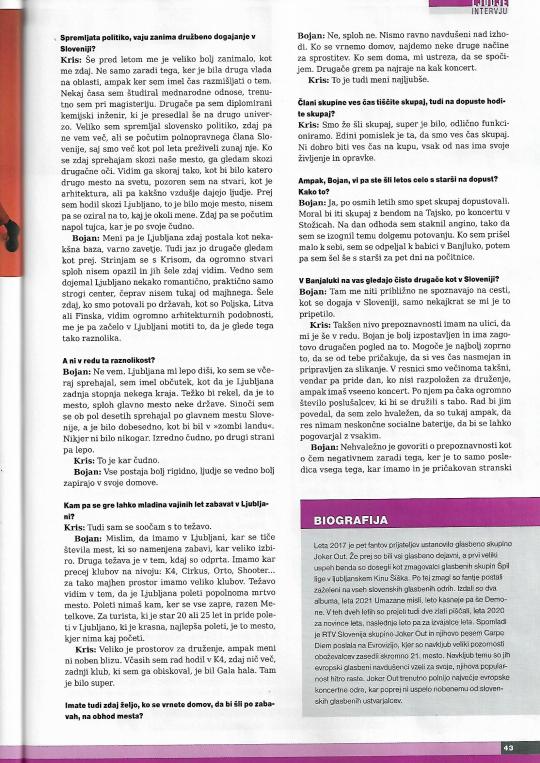

After a fantastic recent concert season with the currently most popular Slovenian music group Joker Out, who have already broken all boundaries at home, the boys are now ready to conquer the world's music stages. European first, said the band's two members, guitarist Kris Guštin and singer Bojan Cvjetićanin, modestly, when we met in their rehearsal room, "Then we'll think ahead." A few days after our conversation, Joker Out embarked on a new tour, which will include 13 European countries, including France, Belgium and Italy. Among others, they will be playing at some of the world's most iconic venues, such as the O2 Shepherd's Bush Empire in London and the Academy 2 in Manchester. A musical success that has no comparison here.
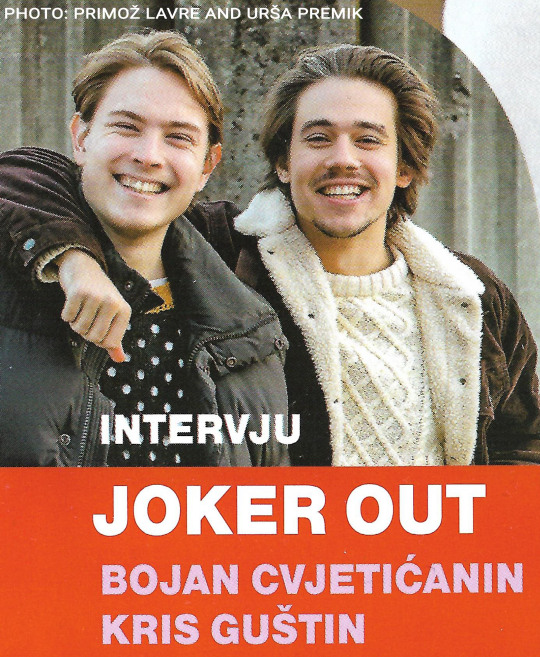
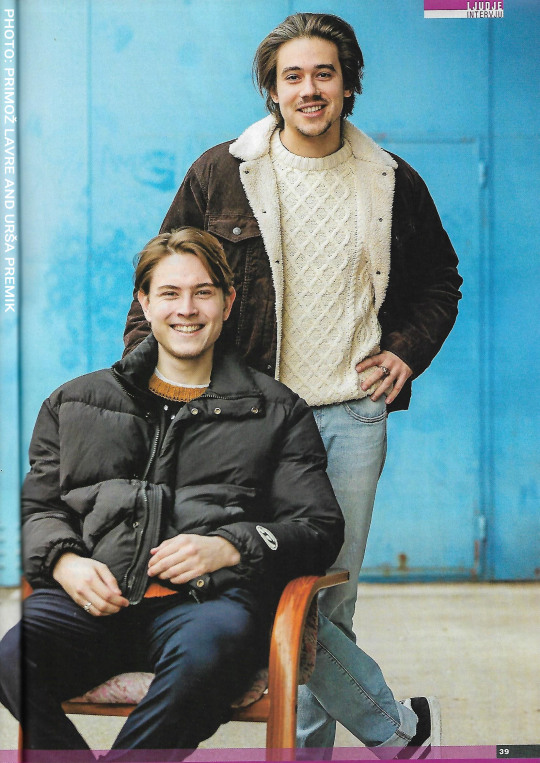
I'm sure you have given hundreds of interviews over the years? How do you cope with them?
Kris: If the questions are good, the interview is also good.
Bojan: During Eurovision we had about 40 interviews a day. Let's say two of them were a little different in terms of questions.
What kind of questions don't you like?
Both: Where did our name come from? When was the band formed? The kind of thing that everybody can find on Google.
Eurovision was a big breakthrough for you abroad, but you also said that you would not do a competition like that again.
Kris: We didn't say that.
Bojan: We have another one in January. We're playing at a festival in the Netherlands, it's a kind of show where you present yourself. It's a competition in a sense, but it's not very specific like Eurovision.
But these music competitions can't be real competitions. They are about the taste of the listener, just as art is about the taste of the observer. How are you going to evaluate a quality, a song?
Bojan: Eurovision is a really interesting experience and has a very specific concept. It's a three-minute spectacle contest, there are tangible standards, but on the other hand there are not. This spectacle may be different from what any of us would think of as "spectacle", let's say a lot of fire, explosions, and fireworks, but if the story is properly told in the flood of all these fires and explosions, just one deep silence can make the performance spectacular. For us, the competition was more about whether or not we would make that breakthrough. A contest against ourselves.
When you were at Eurovision, did you have in mind the country you were representing, or did you, first and foremost, see yourself in this contest? As an opportunity for the group to present itself?
Bojan: It was absolutely important for us to sing in Slovenian at this festival because we are advocates and representatives of the fact that it is possible to create in our language and that it is right to create in our language. It's right to speak it and it's right for the language to develop. The younger generations of Slovenians are also gaining an appreciation for the Slovenian language and an understanding of what it can be used for. The aim was to show ourselves. In the end, it is true that a country wins, let's say Sweden won, or Finland won, but the most important thing for us was that when someone says, "Do you remember Slovenia in 2023?" that it will be a positive image and a positive memory. We managed to do that, which is a big enough victory as far as we are concerned. At the same time, we did everything we could to represent ourselves and Slovenia in the best possible way.
Despite all this, we welcomed you home with great joy, we did not blame you for your result in the competition, because we saw that you gave your all.
Bojan: I was honestly happy to see the positive reaction, even though objectively speaking we had a pretty poor placement.
Kris: After a long time, us Eurovision performers also had the same kind of support of the nation at home that our athletes have.
It's interesting that you hold on to the Slovenian language so lovingly and don't give in to the prejudices that claim that Slovenian is not a poetic and melodic language. You write songs in various languages, but mostly in Slovenian.
Bojan: For me, it is most natural to write songs in Slovenian. My thought process, during my subconscious existence, is in the Slovenian language.
Your parents are not of Slovenian nationality, they both came from Bosnia during the war in 1991, with the last Unprofor convoy. Kris's mother is also Dutch, and you both love the Slovenian language.
Kris: My mother moved to Slovenia before Slovenia joined the EU and, as she explained to me, it was very difficult for her at that time too. All the bureaucratic stuff dragged on, just like it would for someone who came from Bosnia.
Bojan: I never had any problems with my parents being from Bosnia. I was at a school where there were quite a lot of children who had parents from the former Yugoslavia and we had no problems with that. I coped with the Slovenian language quite well from a very young age. However, this does not change the fact that the living conditions of many children at our school were of a lower standard. I don't know what was going on in their homes, because I know that for many it was not so rosy at home, but we children did not feel any revolt or hatred from our classmates at that time.
Your parents are both doctors, and they have made a new home in Slovenia. Do you still go to Bosnia?
Bojan: Yes, more and more often. I feel very Slovenian, I think and speak in this language, but on the other hand I am immensely proud of my roots and I also feel Bosnian, Serbian, at my core, and it seems to me that the fans from the former Yugoslav countries have now taken us very much as their own because of that.
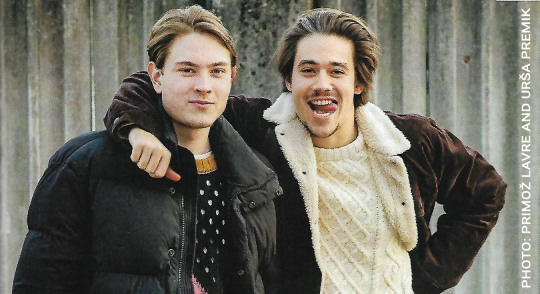
You had very successful concerts in Zagreb and Belgrade. Interestingly, the visitors knew all your songs by heart, and what's more, they sang them with you in Slovenian. We haven't been used to that since the days of Lačni Franz* and Videoseks.*
*(The only two groups prior to Joker Out who succeeded in ex-Yugoslavia region enough to have the audience sing their songs in Slovenian)
Kris: Isn't it interesting that we find it bizarre that Serbs are singing in Slovenian, because before it was always the other way around?
Bojan: I also never understood before that Croatians or Serbs didn't understand us. As in, is the difference in languages really so big that you don't understand us? We can understand you. The fact is that Slovenians have been in contact with the Serbo-Croatian language in one way or another since we were very young, we all go to the seaside in Croatia, and we also listen to music from those parts en masse.
But the young people of your generation speak to the locals on the Croatian coast in English because they no longer understand their language.
Both: Yes, that's also true.
How come these Balkan languages don't cause you any problems?
Bojan: It's my mother tongue anyway, so I don't have any problems.
Kris: It seems very stupid to me that Slavs should communicate in Germanic languages. Even with the Czechs at Eurovision we communicated in both languages and it worked. It seems to me very inauthentic to speak English, but on the other hand I understand, because young people in Slovenia today are surrounded by English, maybe even more than Slovenian, and it is much more natural to them than to struggle in their own language or in a language that is supposed to be related to their own. It would be interesting if "interslavic" was introduced in all countries with Slavic languages as a second or third language. This is a mixture of all the Slavic languages, which is supposedly understood by all the members of the Slavic peoples. A language that is similar in its own way to all of us.
Esperanto, invented in the late 1980s as a counterbalance to the overuse of English, was a similar project. I do not know how many people still use it today.
Kris: Introducing a new language is not the easiest cultural process.
You have a big tour coming up, actually the first tour of European capitals.
Kris: Yes, first we're going to Skopje, then Munich, The Hague, Amsterdam, Madrid and Barcelona. On the 11th of December we're going back to Slovenia for a week, when we're planning to record some more in the studio, and then we're going to do concerts until the end of the year in Slovenia, in Celje, Maribor, Novo mesto and Ljubljana.
These tours must be exhausting. Every day travelling, buses, different cities, masses of people wanting something from you.
Kris: We have six concerts coming up now.
Bojan: We've just played nine concerts in fourteen days, we were in Lithuania, Poland, Czechia and Croatia.
Do fans in other countries remember you only from Eurovision or do they know your other songs as well?
Bojan: The most fascinating thing is that they have learned all the songs from the past too. We actually managed to break that barrier with just one song, but people learned two hours of material in another language. I don't know how many hours they had to devote to it, but they did.
Are you surprised by such enthusiasm? None of you could have planned this.
Kris: We went to Eurovision with this intention, so we can't say that we were completely surprised by the success. The ultimate goal all along was to make a breakthrough abroad. But we were absolutely surprised by the scope of the response. It could have been that Carpe Diem would have been very successful abroad, but the other songs would not have caught on. But we get to the concert and there is no feeling of waiting for this greatest hit, from the first minute people are "in it" and singing.
Bojan: If we sometimes dropped a song from our repertoire that we didn't want to play in Slovenia anymore, one of them being "Proti toku" because it was totally getting on our nerves, there were revolts on the internet and people were carrying banners at concerts saying "Play Proti toku!"
Kris: When we released New Wave with Elvis Costello, we thought that foreigners would prefer to listen to the song in English, but somehow everyone demanded it in Slovenian.
Bojan: They learned the Slovenian version and that's what they want.
I could say that you are kind of the pioneers of a new wave of Slovenian music, one for which Slovenia is obviously too small. None of the previous Slovenian Eurovision representatives have impressed Europe so much.
Bojan: I really don't remember us having any artist like that before. When Sestre went to Eurovision, they rode the wave at the time too, they were doing a lot of international shows too. I mean, it was a different concept, it was a project, but it still worked. Mostly because they actually had a vision, a plan and also a background behind them, there has to be some kind of support mechanism in the process. We didn't have performers in the sense of, okay, you showed up at Eurovision, now do a one-hour concert for me. Most of the performers couldn't do that because they didn't even have enough songs.
Kris: It's not only a problem in Slovenia, you find it everywhere, even among foreign artists. The Norwegian representative was fifth in Eurovision this year, she's very popular, but she only had one song on the market after the contest was over. Now she is going to release an album, but she hasn't had enough material so far.
Have you been preparing on your own to go abroad or do you maybe have some very professional agencies behind you to promote you and push you forward?
Bojan: With the people who are with us, we are our own management. We've never had someone above us who was our boss. We have always been our own bosses. We have our own people around us, but we have reached a level of performing in Slovenia that requires you to have a big team around you. We have about 30 people accompanying us on a regular basis, including the driver. When this success story happened, this breakthrough abroad, we were able to channel our system in a new direction, to at least somehow "patch up" the line up abroad for this year.
Do you cultivate a system of democracy in the band? How do you agree on certain things? By raising your hands?
Bojan: There hasn't been a need for that so far.
Kris: Usually the majority wins, within reasonable limits, of course.
Where do you find yourself more, live performances, making music, travelling, mingling with fans?
Kris: It really depends on the time period. It has to alternate. Solely playing infinite concerts is really fun for a while, but then it becomes tiring. The number of concerts we have played now is just about on the borderline for us to go back to the studio again for some time. On the other hand, spending infinite time in the studio isn't good either. During Covid, we were locked in for two years and we were just making music the entire time, and somewhere in there we kind of lost motivation. In the studio you also realise why you love the stage.
Are you tired after concerts, after a few hours of jumping around the stage?
Kris: The concert itself tires you out much less than the travelling. If you're lucky enough to be able to afford a private bus that takes you from concert to concert, then it's a lot easier. You get into it after the concert, fall asleep, and wake up in another city. The tour that is ahead of us, however, is made up entirely of flying, and that is the worst. Hotels, rushing, packing, taxis, airports, the atmosphere in airports is really unpleasant, no one is happy there, the hours drag on... that is the harder part. The concert itself doesn't tire me out that much. Most of all, we could play two concerts in a row if the atmosphere is right.
All that requires psychological and physical fitness as well. Do you practice any sports?
Kris: I used to be a more sporty person, I regularly played tennis, but ever since Eurovision, I can't find the right time to go back to something regular. I also used to play football recreationally every week, that's gone too. When on tour, I can only afford to run or to go to the hotel gym. But I haven't gotten to the point where I could make peace with that yet.
Bojan: I currently don't exercise at all. I used to train judo for a long time, but now, unfortunately, I haven't yet forced myself to go to the gym or go running when I have a free day. I'd like to start doing that, but I'm the type of person who needs a companion to pull me along and motivate me every day. I'm most drawn to football, martial arts, or extreme sports, but now I don't dare to do anything anymore because of injuries. Lately I've been going horse riding when I'm home. I find that horses calm me down.
Do you follow politics, are you interested in what's going on in Slovenian society?
Kris: Even a year ago, I was a lot more interested than I am now. Not just because we had a different government, but because I had time to think about it. I studied international relations for a while, I'm currently doing my master's. Otherwise I'm a chemical engineering graduate who switched to another university. I used to follow Slovenian politics a lot, but now I don't know if I feel like a fully qualified citizen of Slovenia anymore, since we've spent more than half a year outside of it. When I walk through our city now, I see it with different eyes. I see it almost as if it was any other city in the world, I pay attention to things like architecture or the atmosphere people create. Before, I used to walk through Ljubljana, it was my city, but I didn't pay attention to what was around me. Now I feel like half a stranger, which is weird in a way.
Bojan: For me, Ljubljana has now become a kind of base, a safe haven. I also see it differently than before. I agree with Kris that there are plenty of things that I didn't notice at all and I only see them now. I always perceived Ljubljana in a kind of romantic way, pretty much only the centre, even though I didn't live there from a young age. Only now that we've travelled around countries like Poland, Lithuania, or Finland, I see a lot of architectural similarities, but it has started to bother me that Ljubljana is so diverse in this aspect.
Is this diversity not a good thing?
Bojan: I don't know. Ljubljana smells nice to me, when I was walking around yesterday, I felt like Ljubljana was the last stage of a place. It's hard to say that this is a city, let alone a capital city of a country. Last night I was walking around the capital city of Slovenia at half past nine, and it was literally like I was in a "zombie land". There was no one anywhere. Incredibly weird, but on the other hand, nice.
Kris: That's pretty weird.
Bojan: Everything is getting more rigid, people are locking themselves up in their homes more and more.
Where can young people of your age go out in Ljubljana?
Kris: I'm facing this problem too.
Bojan: I think that in Ljubljana, we have quite a lot of choice when it comes to the number of places meant for parties. When they are open is another problem. We have a number of high quality clubs: K4, Cirkus, Orto, Shooter... for such a small place, we have a lot of clubs. The problem for me is that Ljubljana is a completely dead city in the summer. You can't go anywhere in the summer because everything closes down except Metelkova. For a tourist who's 20 or 25 years old and comes to Ljubljana in the summer, when it's wonderful, it's the most beautiful in the summer, it's a city where they have nothing to do.
Kris: There are plenty of places to hang out, but none of them appeal to me. I used to like going to K4, not anymore now, the last club I visited was Gala hala. It was awesome there.
When you come home nowadays, do you want to go to parties, go around the town?
Bojan: No, not at all. We're not really enthused about going out. When we come back home, we find other ways to relax. When I'm home, it suits me to be able to rest. Otherwise, what I like best is going to a concert.
Kris: That's what I like best too.
The band members constantly stick together, you even go on holidays together?
Kris: We already went together, it was awesome, we function great. The only concern is that we're constantly together. It's not good to be together all the time, each of us has his own life and things to do.
But, Bojan, you even went on holiday with your parents this year? How come?
Bojan: Yes, after eight years, we went on holiday together again. I was supposed to go to Thailand with the band, after the concert in Stožice. I got tonsillitis on the day of departure, so I avoided the long journey. When I felt a little better, I went to my grandma in Banja Luka, and after that, I went on holiday with my parents for five days.
Do they look at you differently in Banja Luka than in Slovenia?
Bojan: They don't recognise me on the street there nearly as much as it happens in Slovenia, it has only happened to me a few times.
Kris: The level at which I get recognised on the street is still okay for me. Bojan is more exposed and definitely has a different perspective. Maybe the most annoying thing is that you are expected to constantly be smiling and ready to take photos. We really are like that most of the time, but there are days when you're not in the mood to socialise, but you still have a concert. Afterwards, a lot of listeners are waiting and would like to hang out with you. I'd like to tell them that I am very grateful that they're there, but that I really don't have a never-ending social battery to be able to talk to all of them.
Bojan: It is ungrateful to talk about recognisability as something negative, because it's simply a consequence of everything we have and it's an expected side product. If I'm in a public place, I know that everyone around me is listening to what I'm talking to someone about. It has become uncomfortable to talk about anything personal with anyone, because you always feel like someone is eavesdropping.

What's your favourite thing to do when you finish a gig?
Kris: The first thing I do is to take a shower. I hang out a little with the team, with the band members, sometimes we go out to take photos, but otherwise, as soon as possible I drink a glass of water and go directly to bed.
Bojan: I'm such a good boy. I always take at least one hour for taking photos with fans.
I haven't yet come across you getting caught drunk or high on various substances, which isn't rare in the music world, it's more like a rule.
Bojan: I view all these extreme excesses as filling a void. For 99 percent of these performers who are said to do this, the roots of those voids are very clear. They come from personal trauma, mostly from childhood. Thankfully all five of us in the band come from very stable and happy families, none of us lacked for anything, quite the opposite, we all had everything endlessly. We have maximum support from all the people around us. We don't feel the need to rebel against anything, because we actually have nothing to rebel against. All these bands that did a lot of drugs and alcohol actually mostly broke up very quickly.
Bojan, you appear to be very energetic on stage, you're spontaneous and charismatic, you have the public eating our of your hand. Do you unleash your alter ego on the stage? Is that a different Bojan?
Bojan: You'd have to ask the guys from the band who spend the most time with me. As far as I know from the stories from people who have known me since I was little, I have always been loud and very talkative. I always liked performing and I wouldn't say that I put on an act on stage. On stage, I let myself go to the max, I think that I really mould myself into what I think belongs on stage. It's not a different Bojan on the stage, he just does some things that belong on stage.
Kris: Bojan on stage is in a higher gear. It's the same for the whole band.
Bojan: People can feel other people. Everything that happened to us is also in large part a consequence of people actually feeling that we are the same people on stage as we are when we come off the stage. We're real here, there's no acting, we also don't think that we're any better than them. We're all friends, they're below the stage, we're on the stage, and we have fun together.
Kris: It's also true that I feel more free on stage. We're allowed more. I enjoy the fact that our concert is a sort of a valve, even though I hate that word.
Like every ordinary woman, I can't skip past your fantastic stage clothes. All my female friends want to wear them.
Bojan: I would also like to wear them in my private life, but I already have a closet full of clothes that have piled up throughout my life, and they aren't like the ones we wear at gigs. But I would like to walk out of my room every day dressed in a way that made me look like I'm in Miami in the 80s, or like a mix between a "drug dealer" and a "drug cop".
Kris: My sister has already looted my closet. I looted my dad's.
Bojan: I have looted the closets of my parents and my sister.
Kris, your dad is a famous musician. Did he help you at the start, what kind of advice does he give you?
Kris: My dad only helped me in the sense that I sometimes showed him what I had written or what we had recorded in the studio, and he gave his opinion. But that hasn't happened in a year now, ever since I moved out. Before that, he could hear me through the walls when I was playing.
Bojan: I've also become independent. Although now when we come back from a tour, I still like going back home the best.
What does independence look like?
Kris: I like it. I can't imagine going back home anymore, even though I love my family immensely. But us not living together anymore has only made our relationships better. I like having my own peace, but I also like coming back home for lunch.
BIOGRAPHY
In 2017, five friends started a band called Joker Out. They had all been musically active before, but they achieved the first big success as a band as the winning group of Špil liga in Kino Šiška in Ljubljana. After this victory, the boys became sought-after on all Slovenian musical stages. They released two albums, Umazane misli in 2021 and Demoni a year later. In those two years, they also received two 'Zlata piščal' ('Golden Flute') awards, in 2020 for newcomers of the year, and again next year for artists of the year. This spring, RTV Slovenia sent Joker Out and their song Carpe Diem to Eurovision where, despite a lot of attention from fans, they ended in a modest 21st place. Despite that, European music enthusiasts have welcomed them as their own, their popularity is growing quickly. Joker Out are currently filling the biggest European concert stages, which no Slovenian musician has managed before.
If you repost quotes from the interview, please link back to this post!
#joker out#bojan cvjeticanin#bojan cvjetićanin#kris gustin#kris guštin#Spotify#jo: bojan&kris#type: article#source: reporter magazine#og language: slovenian#year: 2023#jos original: podcast
153 notes
·
View notes